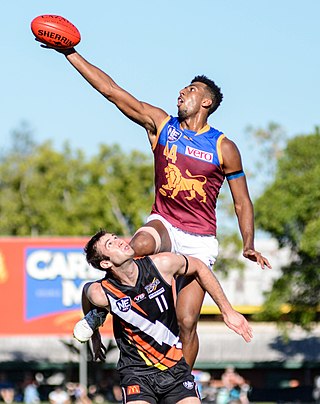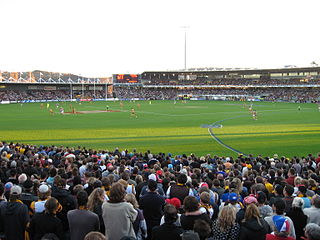Related Research Articles

Australian rules football, also called Australian football or Aussie rules, or more simply football or footy, is a contact sport played between two teams of 18 players on an oval field, often a modified cricket ground. Points are scored by kicking the oval ball between the central goal posts, or between a central and outer post.

Nicholas Fredrick Riewoldt is a former Australian rules footballer who played for the St Kilda Football Club in the Australian Football League (AFL). He was the first draft selection in the 2000 AFL draft. He was the captain of St Kilda in 2005 and from 2007 to 2016. Riewoldt is a five-time All-Australian. He holds the all-time record for most marks in VFL/AFL history, surpassing Gary Dempsey in late 2017.

Interchange is a team position in Australian rules football, consisting of players who are part of the selected team but are not currently on the field of play.
Fraser Gehrig is a retired Australian rules footballer who played for the St Kilda Football Club and the West Coast Eagles in the Australian Football League (AFL).

A mark in Australian rules football is the catch of a kicked ball which earns the catching player a free kick. The catch must be cleanly taken, or deemed by the umpire to have involved control of the ball for sufficient time. A tipped ball, or one that has touched the ground cannot be marked. Since 2002, in most Australian competitions, the minimum distance for a mark is 15 metres.

The laws of Australian rules football were first defined by the Melbourne Football Club in 1859 and have been amended over the years as Australian rules football evolved into its modern form. The Australian Football Council (AFC), was formed in 1905 and became responsible for the laws, although individual leagues retained a wide discretion to vary them. Following the restructure of the Victorian Football League's competition as a national competition and the League's renaming to be the Australian Football League (AFL), since 1994, the rules for the game have been maintained by the AFL through its Commission and its Competition Committee.

Brent Guerra is a former Australian rules football player who played with the Port Adelaide Football Club, St Kilda Football Club, and Hawthorn Football Club in the Australian Football League.
A super goal was a method of scoring used in the Australian Football League's pre-season competition in the sport of Australian rules football, from 2003 to 2017. Under the rule, a goal scored from a distance greater than fifty metres is awarded nine points, instead of the regulation six points. The innovation is not used during the premiership season.

A free kick in Australian rules football is a penalty awarded by a field umpire to a player who has been infringed by an opponent or is the nearest player to a player from the opposite team who has broken a rule.

The AFL siren controversy, informally known as Sirengate, was the controversial conclusion and result of an Australian rules football match played on 30 April 2006 during round 5 of the Australian Football League's 2006 season. The match was played between the St Kilda and Fremantle Football Clubs at Aurora Stadium in Launceston, Tasmania.
The 2008 AFL season was the 112th season of the Australian Football League (AFL), the highest level senior Australian rules football competition in Australia, which was known as the Victorian Football League until 1989. The season featured sixteen clubs, ran from 20 March until 27 September, and comprised a 22-game home-and-away season followed by a finals series featuring the top eight clubs. A significant feature of the season was the celebration of the 150th anniversary since the sport of Australian rules football was first established in 1858.
The 2003 Wizard Home Loans Cup was the Australian Football League competition played in its entirety before the Australian Football League's 2003 Premiership Season began. The AFL National Cup is also sometimes referred to as the pre-season cup because it is played in its entirety before the Premiership Season begins. The final was won by Adelaide for the first time in its history, defeating Collingwood by 31 points

This list is an alphabetical glossary of Australian rules football terms, jargon and slang. While some of these entries are shared with other sports, Australian rules football has developed a unique and rich terminology.

The 2009 AFL season was the 113th season of the Australian Football League (AFL), the highest level senior Australian rules football competition in Australia, which was known as the Victorian Football League until 1989. The season featured sixteen clubs, ran from 26 March until 26 September, and comprised a 22-game home-and-away season followed by a finals series featuring the top eight clubs.

The 2009 AFL Grand Final was an Australian rules football game contested between the St Kilda Football Club and the Geelong Football Club at the Melbourne Cricket Ground on 26 September 2009. It was the 113th annual grand final of the Australian Football League, staged to determine the premiers for the 2009 AFL season.

The 2010 AFL season was the 114th season of the Australian Football League (AFL), the highest level senior Australian rules football competition in Australia, which was known as the Victorian Football League until 1989. The season featured sixteen clubs, ran from 25 March until 2 October, and comprised a 22-game home-and-away season followed by a finals series featuring the top eight clubs.

The 2013 AFL Grand Final was an Australian rules football game contested between Hawthorn Football Club and Fremantle Football Club at the Melbourne Cricket Ground on 28 September 2013. It concluded the 118th season of the Australian Football League, staged to determine the premiers for the 2013 AFL season. The match, attended by 100,007 spectators, was won by Hawthorn by a margin of 15 points, marking the club's eleventh VFL/AFL premiership victory. Hawthorn's Brian Lake was awarded the Norm Smith Medal as the best player on the ground.
Griffin Logue is a professional Australian rules footballer playing for the North Melbourne Football Club in the Australian Football League (AFL), having previously played for the Fremantle Football Club.
The 2019 AFL season was the 123rd season of the Australian Football League (AFL), the highest level senior men's Australian rules football competition in Australia, which was known as the Victorian Football League until 1989. The season featured eighteen clubs, ran from 21 March until 28 September, and comprised a 22-game home-and-away season followed by a finals series featuring the top eight clubs.
References
- ↑ Australian Football Match Policy pg 21
- ↑ "Interpretations of rules". Advocate. Burnie, TAS. 5 August 1939. p. 9.
- ↑ "Cribbing on the mark". The Daily News. Perth, WA. 4 May 1939. p. 14.
- ↑ "Fos Williams on 15-yard penalty clause". The News. Adelaide, SA. 13 July 1954. p. 32.
- ↑ Hogan, Kevin (7 April 1955). ""Get tough" order given umpires on new rule". The Sun News-Pictorial. Melbourne, VIC. p. 33.
- ↑ Timms, Daryl (16 March 1988). "'Go' on footy rules". The Sun News-Pictorial. Melbourne, VIC. p. 84.
- 1 2 De Silva, Chris (15 April 2022). "'One of the worst': Umpire's head-scratching 50m penalty call causes mass confusion". Wide World of Sports. Retrieved 20 April 2022.
- ↑ "Not in the 'spirit of the game'? Why 50-metre penalty could be reduced in AFLW". 1 March 2020. Retrieved 20 March 2020.
- ↑ "Cats coach floats 25m penalty for AFLW as costly 50m penalties mount". 4 March 2020. Retrieved 12 March 2020.
- ↑ AFL rule is well worth trying here | Irish Daily Star
- ↑ Cowley, Michael (9 May 2005). "A bone to pick over 50m dog sledge penalty". The Sydney Morning Herald . Retrieved 28 December 2019.
- ↑ "~Dockers, Saints and Sirengate~"
- ↑ Laidley fumes at umpire blunder | News.com.au
- ↑ "Barry Hall gives away 3 50 metre penalty". YouTube. shufflebailey. Retrieved 12 February 2022.
- ↑ "Heartbreaking Player Profile Shows Nick Riewoldt Stitched Up One of His Biggest Fans". Triple M. 3 July 2017. Retrieved 3 July 2017.
- ↑ "Footy fans furious after Nick Riewoldt tricks Fremantle". Herald Sun. 2 July 2017. Retrieved 3 July 2017.
- ↑ "Last-minute heartbreak as Dockers steal victory". 1 March 2020. Retrieved 13 March 2020.
- ↑ Welsh, Sophie (23 February 2022). "Final siren heartbreak as Giants snatch victory from Saints". AAP. AFL Women's. Retrieved 24 February 2022.